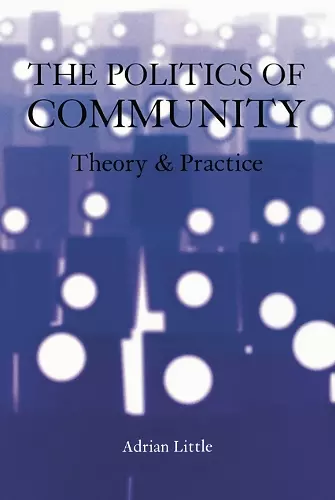The Politics of Community
Theory and Practice
Format:Paperback
Publisher:Edinburgh University Press
Published:5th Mar '02
Currently unavailable, and unfortunately no date known when it will be back

Community is one of the most widely used yet also one of the most complex concepts in modern political thought. This book provides an introduction to the concept, showing how philosophical ideas can be used in political practice. The aims of the book are: - to provide a critical analysis of the historical use of the concept of community in political philosophy and sociological theory - to demonstrate the problems that emanate from the division between communitarianism and liberalism - to contrast the orthodox views on communitarianism of conservative thinkers in the UK and USA with more radical and egalitarian perspectives - to consider possible new ways of thinking about notions of community in relation to social and economic policies - to show the relevance of community to debates about democracy, pluralism, difference and the future of the state and civil society While other books consider either the philosophical or the policy elements of community, this book is unique in drawing together these strands and demonstrating their links. As such it is an ideal textbook for undergraduate students, grounding abstract and quite difficult theory in contemporary situations.
A rich study of how community has been dealt with in social and political theory, providing an especially detailed critique of communitarian thought. It also investigates the implications of community for pulblic policy and political action. This text would be ideally suited to advanced undergraduate courses. The virtue of this book is to challenge the hegemony of the practice of market liberalism from a communitarian perspective, and to attempt to draw practical implications for social policy. -- Takeshi Nakano Given the extent to which community now dominates political discourse as a remedy for all the economic and social problems of society, a book that explicitly addresses the 'politics of community' is both timely and relevant. This book captures the latest debates about community within contemporary politics, it draws upon the most up-to-date literature from political philosophy and sociological theory to advance its argument, it provides a detailed critique of conservative, communitarian ways of thinking about community, and it links philosophical conceptions of community with their policy manifestations. A rich study of how community has been dealt with in social and political theory, providing an especially detailed critique of communitarian thought. It also investigates the implications of community for pulblic policy and political action. This text would be ideally suited to advanced undergraduate courses. The virtue of this book is to challenge the hegemony of the practice of market liberalism from a communitarian perspective, and to attempt to draw practical implications for social policy. Given the extent to which community now dominates political discourse as a remedy for all the economic and social problems of society, a book that explicitly addresses the 'politics of community' is both timely and relevant. This book captures the latest debates about community within contemporary politics, it draws upon the most up-to-date literature from political philosophy and sociological theory to advance its argument, it provides a detailed critique of conservative, communitarian ways of thinking about community, and it links philosophical conceptions of community with their policy manifestations.
ISBN: 9780748615438
Dimensions: unknown
Weight: 338g
224 pages